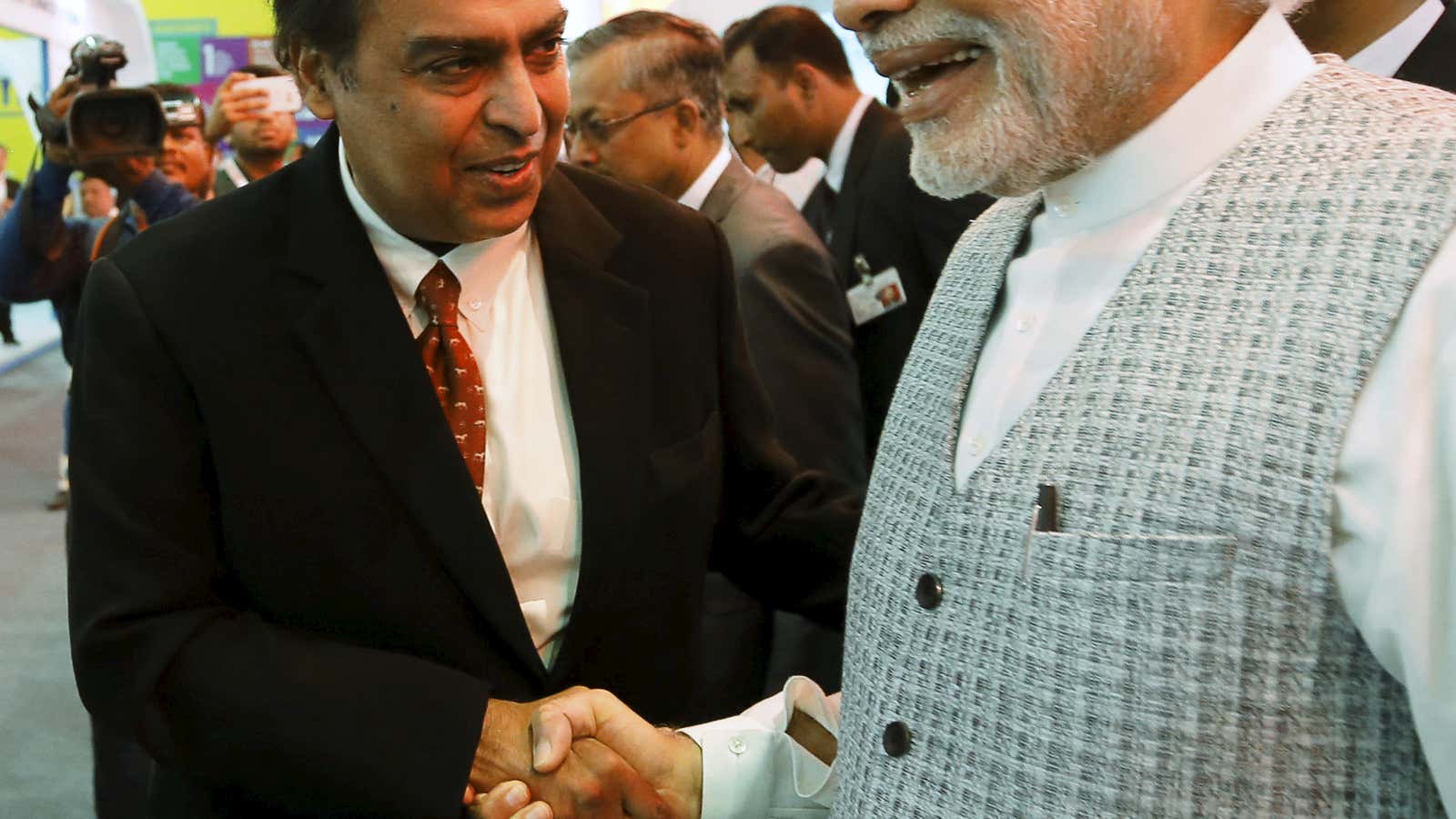Last week, Google announced an Android smartphone in collaboration with Reliance Jio, the telco spearheaded by India’s richest man Mukesh Ambani.
The two companies have a shared a vision “to bring affordable access to information for Indians in their own language, to build new products and services for India’s unique needs, and to empower businesses with technology,” Google CEO Sundar Pichai wrote in a June 24 blog post. Once again, Silicon Valley giants are seeking Ambani’s support to ensure their longevity in India.
The Free Basics failure
This Google-Jio collab is reminiscent of another global giant’s failed attempts at securing the vast Indian market: Facebook and its Free Basics project.
In February 2015, the Mark Zuckerberg-led company debuted Internet.org (later Free Basics) in India—interestingly, in partnership with Reliance Communications, which is run by Ambani’s estranged and penniless brother Anil—to improve internet access in India, he said. After net neutrality activists criticized the offering, Reliance Communications put the service on hold in December that year. Days later, Zuckerberg laid bare his disbelief in an op-ed, wondering out loud “who could possibly be against this?”
India’s telecoms regulator, that’s who. The problem, unlike Google-Jio’s subtle push, was that Facebook’s platform was patently limiting. It allowed access to just 36 bookmarked sites and Facebook was the only social network available. The company tried to partner with local Indian platforms like recruiting site Hiree.com and payments giant Paytm, but they didn’t participate.
“The Jio-Google partnership is more around leveraging the Android ecosystem and services to create affordable smartphones for users. The internet provider will most likely be Jio, but users should be able to have other providers as well over time,” Yugal Joshi, vice-president at consultancy Everest Group, told Quartz. “Therefore, this initiative is quite different to Facebook one, where people were more concerned about internet ownership.”
While it’s not boxed-in like Free Basics, it would be naive to believe Google and Jio won’t push their own ecosystem, experts say. But a little nuance combined with Ambani’s blessing can go a long way in India—a country where big billionaires yield huge power over the Narendra Modi government.
Google phones with Jio products
The Google-Jio phone will let people “utilize their Google Assistant to deliver a great experience with many of the Jio apps on this device. In addition to asking for the latest cricket scores or a weather update, users can also ask Google Assistant to play music on JioSaavn or check their balance on My Jio,” the June 24 note said.
The Jio ecosystem has a plethora of services to offer, from video-on-demand app JioTV to e-grocery app JioMart to digital payments platform JioMoney. Jio also has its own individual apps for messaging, video conferencing, file sharing, cloud storage, web browsing, apartment security, health monitoring, online gaming, and news.
These bundled apps, along with Jio’s low prices, will act as bait for consumers, experts say. But they won’t be openly restrictive. So, while the two forces coming together could raise competition concerns, net neutrality will likely not be violated.
What’s also reassuring for Google is that this deal is far less unstable than the one Facebook struck five years ago. After all, there is big money involved. In July 2020, Google invested $4.5 billion for an almost-8% stake in Jio.
“With Google taking a multi-billion stake in Jio Platforms earlier, and expanding its Android and other teams in India working closely with Jio, this partnership is markedly different than others in the past,” says Joshi.
For Facebook, which pumped in $5.7 billion for nearly 10% stake in Jio in April 2020, the goalposts have shifted. Bringing Free Basics to India is no longer a priority. But it does have other plans.
WhatsApp and Jio’s symbiotic relationship
Facebook is leaning on Jio to secure its messaging service WhatsApp’s future in the country.
Despite concerns around fake news, Pegasus spyware, and data privacy, WhatsApp has “long emerged from the shadows of Facebook and stands as an intrinsic part of the popular Indian consciousness,” says Salman Waris, a partner at legal firm TechLegis. “The Mark-Mukesh deal yet again underscored WhatsApp’s authority in India. Seeing India to be WhatsApp’s, and by extension Facebook’s greatest user, it can be said that Facebook’s journey in India has only been made easier with the Reliance associations.”
The biggest proof of this is its payments product.
The messaging app started testing its payments feature in India in February 2018, but two years on, it still didn’t have the regulatory nods for a full-fledged launch. However, after Ambani began rolling out a JioMart integration on WhatsApp in April 2020, the wheels of India’s regulatory machinery began spinning faster.
Although restricted to 20 million users—just 5% of its total user base in the country—WhatsApp was able to finally launch payments in India in November 2020.
Now, Jio is helping onboard not just customers but also kirana stores (small convenience stores) onto the messaging service. And JioMart is only the start. In June this year, Jio began offering a recharge service on WhatsApp, too.
There is some sort of “symbiotic relationship” between Reliance and Facebook, says Waris. “Reliance aims to utilize the massive influence of WhatsApp on India, and Facebook wants to propel its digital transaction and payments feature via WhatsApp using Reliances customer base in the country,” he says. “Facebook may also be looking forward to collaborate with an Indian household name in an attempt to avoid the scrutiny it received earlier with Free Basics.”
Global giants are learning that journeying solo in India is tough. Especially since the government banned over a hundred Chinese apps last year and dragged American behemoths like Google and Amazon to court over antitrust issues. As calls for protectionist moves get louder, currying favor with Ambani, who is in the government’s good books, is a huge help. With him by their side, American companies can likely maintain their hold in the market no matter how the laws evolve.
